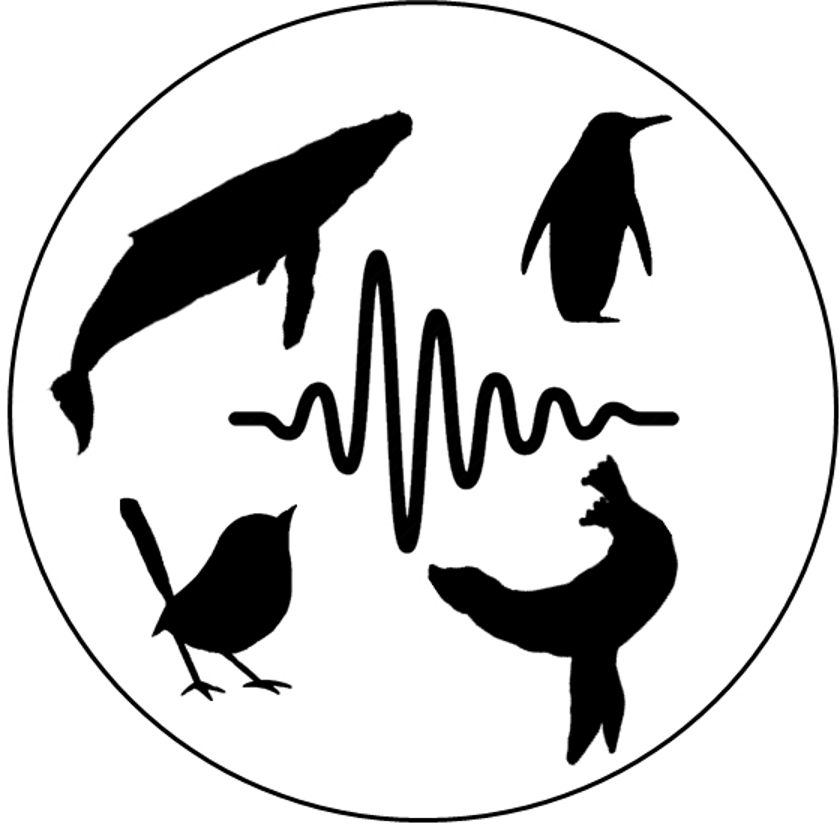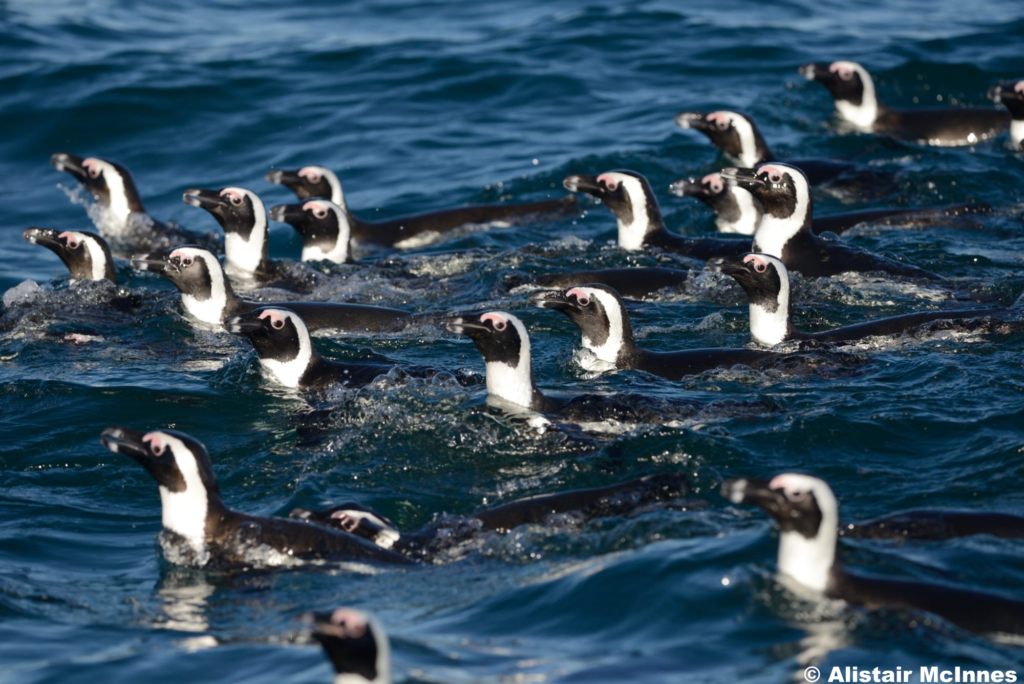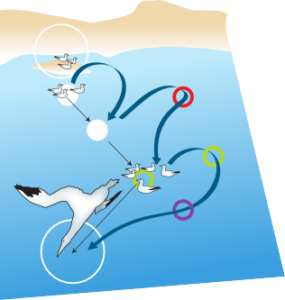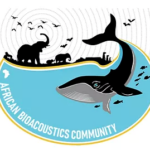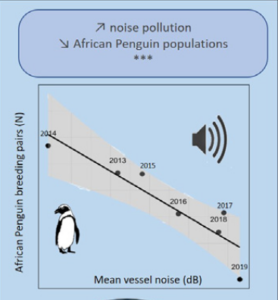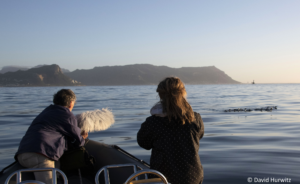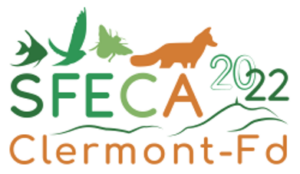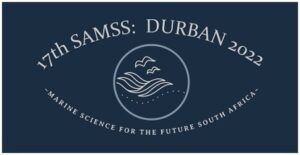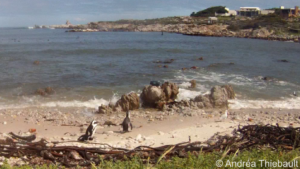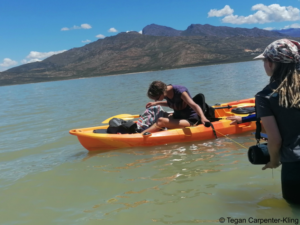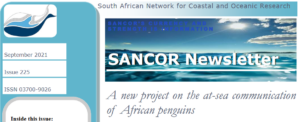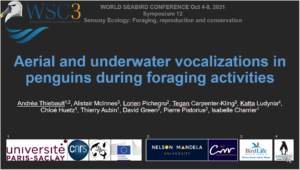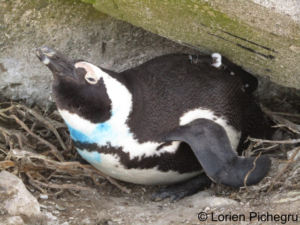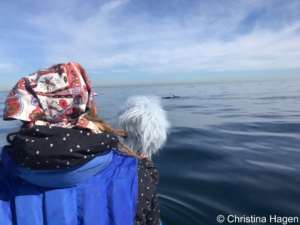by Andréa Thiebault
Acoustic Foraging Network in African Penguins (Spheniscus demersus): significance and vulnerability to anthropogenic noise.
| The AFNAP project aims at assessing the existence and significance of a foraging network based on acoustic signals in a diving seabird, the African penguin. Further to a contribution to fundamental research, this project aims to contribute to the mitigation of anthropogenic marine noise pollution on Endangered seabird populations. | 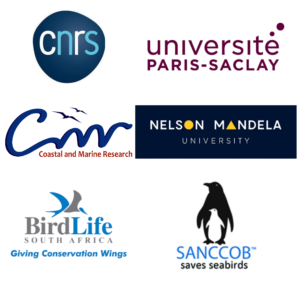 |
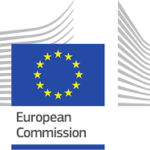
This project is funded by the European Union’s Horizon 2020 research and innovation program under the Marie Sklodowska-Curie grant agreement No 101026088. |
February 2023 – Plenary conference
It was such an honour to be invited as the plenary speaker for “Early Advancements in Research and Science Communication” at the 50th Annual Meeting of the Pacific Seabird Group! For my first plenary presentation at an international conference I had the great pleasure to present my research on group behaviours and communication in foraging seabirds, with two study cases:
First, I presented my previous research on Cape gannets, including their use of social information to locate prey, as well as their strategy to increase feeding success when attacking fish in schools.
 Second, I presented the AFNAP project and elaborated on the implementation of a foraging network based on acoustic signals in African penguins.
Second, I presented the AFNAP project and elaborated on the implementation of a foraging network based on acoustic signals in African penguins.
A huge thank you to the Pacific Seabird Group for their warm welcome!
December 2022 – Flash talk
Presenting the AFNAP project in 3 min was not easy, but I am glad I had this opportunity to talk about my work in front a new community, the Association for the Study of Animal Behaviour!
October 2022 – African Bioacoustics
The 3rd African Bioacoustics Community Conference, and my 3rd participation in this international conference! A not-to-be-missed meeting to talk about our discoveries on the African penguins behaviours and communications when foraging at sea!
August 2022 – Article on maritime traffic
Not exactly as part of the AFNAP project but closely related, we published an article questioning the potential role of noise pollution in the decline in African penguin populations. The article by Pichegru, Vibert et al. entitled “Maritime traffic trends around the southern tip of Africa – Did marine noise pollution contribute to the local penguins’ collapse?” was published in the journal Science of The Total Environment.
We demonstrate that the increase in maritime traffic in Algoa Bay has led to an increase in marine noise in the area, and that this is correlated with the recent dramatic decline in the African penguin population on St Croix island (from 8600 breeding pairs in 2014 to 1200 in 2022).
The causality remains to be proven. This is one of the aims of the AFNAP project, to study the mechanisms by which the penguins may be impacted by marine noise pollution.
The scientific article can be found here: https://doi.org/10.1016/j.scitotenv.2022.157878.
June 2022 – Third fieldwork session
The “ultimate” experiment in bioacoustics: the playback experiment!
Playback experiments consisted in playing the previously recorded calls using a speaker towards free-ranging penguins, and to record their behavioural reaction. Depending on the reaction, we are then able to decipher the function of these calls. During our experiments at sea, we mostly observed vocal reactions (penguins literally “responding” to us), suggesting an importance of vocal communication for penguins to maintain contact with conspecifics over a few hundreds of meters, and thus to form a network at sea!
Such an honour to have conducted these experiments with one of the masters of bioacoustics in France (and internationally): Thierry Aubin !
June 2022 – National conferences
Preliminary results of the project were presented at two national conferences, one in France (51e colloque de la Société Française pour l’Etude du Comportement Animal, oral presentation by Isabelle Charrier) and one in South Africa (17th Southern African Marine Science Symposium, oral presentation by Alistair McInnes)!
Isabelle and Alistair presented the vocal repertoire of African penguins when at sea, which includes both vocalisations emitted from the sea-surface and vocalisations emitted underwater. From the analysis of penguin-borne acoustic devices, several types of calls were identified in various contexts. Now the next step will be to analyse these in conjunction with diving profiles and accelerometry data to investigate the context of use of the different types of calls.
December 2021 – Second fieldwork session
My first fieldwork session with a colleague from the Bioacoustics Team: welcome to the project Chloé H! Despite some challenges due to weather and administrative processes, we can say that this was a successful session for data collection. Many thanks to Chloé, Tegan and Alistair for their constant enthusiasm!
All fieldwork procedures were approved by the BirdLife South Africa Animal Research Ethics Committee.
Noise playback experiments
We played boat motor noise to penguins (neither breeding nor moulting) at the Stony Point colony to record and study their reaction to noise. A speaker was placed a few meters away from a group of penguins (on the picture, the blue speaker can be seen on top of the rocks) and the behaviour of penguins recorded on camera. The data are being analysed but a little heads-up: the penguins do react to noise!
A huge thank you to the BirdLife Ethics Committee and the Cape Nature team for their support.
Propagation experiments of sea-surface vocalisations
Very theoretical, yet very important acoustic experiment. To my knowledge, this is the first time such experiment was conducted on water. So much fun!
We were impressed to see that penguin’s sea-surface vocalisations easily propagate over a few hundreds of meters!
October 2021 – Communications
As I celebrate my 6th month into the project, this month appears to be about dissemination and communication, both to the scientific community and to the public!
The project was presented in the latest issue of the South African Network for Coastal and Oceanic Research (SANCOR) Newsletter!
Check it out here.
Our very first observations and preliminary results were presented at the 3rd World Seabird Conference (4-8 October)!
July 2021 – First fieldwork session
I am so glad I was able to go spend three weeks in Cape Town, South Africa, for a first fieldwork trip on the AFNAP project! This session was focused on one objective: to record the at-sea vocalisations of African penguins.
All fieldwork procedures were approved by the BirdLife South Africa Animal Research Ethics Committee.
Deployments of acoustic recorders on penguins
We have equipped breeding adults with miniature devices to record their vocal activity and associated behaviour at sea: (i) a hydrophone to record potential underwater vocalisations, and (ii) an accelerometer and pressure sensor to record their three-dimensional movement underwater.
A huge thank you to Lorien, Alistair, Tegan and Katta for incorporating these deployments into their long-term monitoring! They successfully collected data throughout the breeding season at different study sites. And I am so grateful for being able to contribute to the deployments in July!
Passive recordings of sea-surface vocalisations
To supplement the data collected using animal-borne devices, we went out at sea to slowly approach penguins, taking care not to disturb them. Indeed, it is essential for this study to not interfere with their natural behaviour to be able to record the vocalisations they spontaneously produced from the sea-surface. This was definitely challenging! But we had a few lucky days with perfect weather, and this was most certainly an exciting experience to directly observe the penguins in foraging action!
June 2021 – Presentation of the project
The project is divided into three research aims:
1) Describe the vocal communication used by foraging African penguins
Seabirds are known to be very noisy at their colonies (Aubin & Jouventin 2002 Adv Stud Behav), where they congregate in large numbers during the breeding season. However, their communication systems at sea (in a foraging context) are extremely poorly known because of the difficulties of collecting data at sea, even though this is where they spend most of their life.
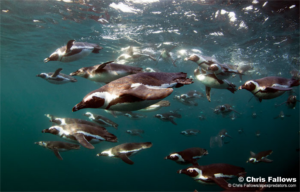 African penguins have long been known to vocalize when at sea (Siegfried et al. 1975 Afr Zool). A recent study revealed the potential of three different types of vocalizations emitted from the sea surface (McInnes et al. 2019 Ibis) but was limited by poor-quality acoustic data. In addition, the existence of vocalizations produced underwater by penguins was recently discovered (Thiebault et al. 2019 PeerJ) but this remains unknown in African penguins.
African penguins have long been known to vocalize when at sea (Siegfried et al. 1975 Afr Zool). A recent study revealed the potential of three different types of vocalizations emitted from the sea surface (McInnes et al. 2019 Ibis) but was limited by poor-quality acoustic data. In addition, the existence of vocalizations produced underwater by penguins was recently discovered (Thiebault et al. 2019 PeerJ) but this remains unknown in African penguins.
With this project, we aim to describe in detail the at-sea vocal repertoire of African penguins.
2) Quantify the implementation of an acoustic foraging network in African penguins
Seabirds are known to cue on each other when at sea to acquire information on the presence of inconspicuous prey (Silverman et al. 2004 MEPS). Active cooperation can take the form of a ‘foraging network’ where individuals maintain a relatively short distance from each other to ‘rake’ the ocean and effectively survey large areas (Assali et al. 2020 J Avian Biol). For flying seabirds which seem to rely mostly on visual cues, such ‘foraging network’ mostly operate over 5-10km distances (up to 40km, Thiebault et al. 2014 Behav Ecol).
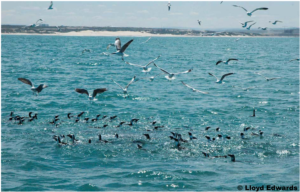 African penguins actively coordinate their feeding behavior in a similar way to cetaceans (Ryan et al. 2012 Ardea) and they benefit greatly from feeding in groups (McInnes et al. 2017 Roy Soc Open Sci). The mechanisms (communication systems) by which they coordinate these group activities are still unknown. Penguins have limited visual range (from the sea surface), so we hypothesize that acoustic signals may play a central role in their ability to communicate at sea. The function of vocalizations emitted by penguins at sea has never been analyzed yet, but recent studies described sea surface vocalizations to be associated with social contexts and grouping behaviors (McInnes et al. 2019 Ibis) .
African penguins actively coordinate their feeding behavior in a similar way to cetaceans (Ryan et al. 2012 Ardea) and they benefit greatly from feeding in groups (McInnes et al. 2017 Roy Soc Open Sci). The mechanisms (communication systems) by which they coordinate these group activities are still unknown. Penguins have limited visual range (from the sea surface), so we hypothesize that acoustic signals may play a central role in their ability to communicate at sea. The function of vocalizations emitted by penguins at sea has never been analyzed yet, but recent studies described sea surface vocalizations to be associated with social contexts and grouping behaviors (McInnes et al. 2019 Ibis) .
With this project, we will investigate the function of at-sea vocalizations in African penguins. We aim to assess the existence of a foraging network based on acoustic signals in penguins and evaluate the distance at which acoustic signals may operate at sea.
3) Evaluate the potential impact of anthropogenic marine noise on foraging African penguins
Anthropogenic noise in oceans has dramatically increased since the industrial age (Weilgart & Butterworth 2007 Mar Mam Welfare), and it is expected to continue increasing with the expansion of the Blue Economy (Smith-Godfrey 2016 Mar Affairs). Noise pollution impacts the physiology, behavior, and sometimes the survival, of all marine life (Williams et al. 2015 Ocean Coast Manage). Awareness around the problem is rising, with most work done on cetaceans and fishes (Duarte et al. 2021 Science).
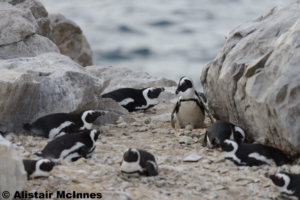 The African penguin is classified as ‘Endangered’ by the IUCN Red List. The population has decreased by 70 % since the early 2000s, largely because of the reduced availability of their prey (Crawford et al. 2011 Afr J Mar Sci). More recently, they showed strong avoidance behavior to seismic survey activities (Pichegru et al. 2017 Sci Rep), suggesting they might be impacted by noise. The emergence of additional threats to their populations is of great conservation concern.
The African penguin is classified as ‘Endangered’ by the IUCN Red List. The population has decreased by 70 % since the early 2000s, largely because of the reduced availability of their prey (Crawford et al. 2011 Afr J Mar Sci). More recently, they showed strong avoidance behavior to seismic survey activities (Pichegru et al. 2017 Sci Rep), suggesting they might be impacted by noise. The emergence of additional threats to their populations is of great conservation concern.
With this project, we will evaluate the vulnerability of African penguins to anthropogenic noise. We aim to contribute to the mitigation of the potential impacts of noise on their Endangered populations.
Partners
Principal Investigator
Dr Andréa Thiebault (CNRS , Paris-Saclay Institute of Neuroscience)
Collaborators
Dr Isabelle Charrier (CNRS , Paris-Saclay Institute of Neuroscience)
Dr Thierry Aubin (CNRS , Paris-Saclay Institute of Neuroscience)
Dr Tegan Carpenter-Kling (BirdLife South Africa)
Dr Chloé Huetz (CNRS , Paris-Saclay Institute of Neuroscience)
Dr Katta Ludynia (SANCCOB)
Dr Alistair McInnes (BirdLife South Africa)
Adj Prof Lorien Pichegru (CMR , Nelson Mandela University)
Funders
This project is funded by the European Union’s Horizon 2020 research and innovation program under the Marie Sklodowska-Curie grant agreement No 101026088.
Related projects
ACNAP Acoustic Communication Network in African Penguins: communication at sea and potential impact of anthropogenic noise on their behaviors.
PIs: I Charrier & L Pichegru
Funded by: CNRS International Emerging Action 2021-2022 & NRF South Africa 2022-2025
Contact
andrea.thiebault(at)cnrs.fr
